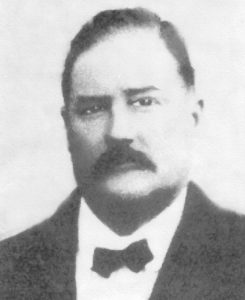Angus Smith Douglas was born February 6, 1864, somewhere in North Carolina. In 1892, Mr. Douglas bought land on the east side of Opp between Cool Springs and Duvall, about where the high school is located today. He had a home built on the North end of Barnes Street, and shortly thereafter brought his wife Mary Emma to their new home.
Mr. Douglas was known to be a major broker of Naval Stores in North Carolina. In 1900 and 1901, J.S. Rozier and J. Frank Williams came from North Carolina and Georgia respectively to join in the building of Opp’s first industry, a Turpentine Still. It is very probable that these two men and their helpers came at the suggestion of A.S. Douglas.
Mr. Douglas always seemed to have the ability to know where and how to get the help needed to make projects successful. He worked quietly but effectively in the background to provide the needed resources and leadership to get the job done.
In 1905, Douglas started The First National Bank of Opp, providing a major part of the financial backing and involving many of Opp’s leading citizens. He brought W.H. Holloway to serve as the first president and F.J. And C.W. Mizell to help in the management. In 1908 Mr. Douglas stepped in as President of First National Bank. During this time two other banks in Opp failed, and First National assumed the deposits of both to see that all depositors were paid in full.
In 1909, Mr. Douglas was “drafted” to assume the mayor’s office. Records show he used his own money to keep the city going and put the city back on a sound and honest financial base. In another significant move, the city passed its first ordinance providing that all buildings in the downtown area must be of masonry construction. This was to prevent the entire town from burning down as one nearby town experienced. In 1910, Douglas was reelected for a two-year term and started the city toward electric power and underground utilities, (water and sewage). An electric power plant operated by steam, and a water storage tank were built near the SW corner of Cummings and Barnes streets in the direction of Douglas. In 1911, Mr. Douglas donated land on Main Street for the Church of Christ.
In 1918, Douglas was persuaded to assume the mayor’s office again. One month after the election a heart attack and failing health forced him to resign and confine his activities to the bank. In 1919 Mr. Douglas realized Opp needed some form of employment to produce something and provide a reliable income for its citizens and a tax base for the government. Though his health was failing, Mr. Douglas boarded a train for New York to seek industry for Opp. At a train stop in North Carolina, Douglas saw a cotton mill. When he returned home, he set about finding the necessary means for a cotton mill. In a conference with Gov. Henderson, he received a recommendation for C.H. Cole. Mr. Cole was hired as manager; property was located, and the Opp Mill was built. Mr. Douglas was the first President, G.C. Nix and J.R. Ward were VP’s, C.W. Mizell was Sec. & Treas. And C.H. Cole was manager. The Opp Mill was an immediate success, perhaps another indication of Mr. Douglas’ connections in New York with sales and distribution. Plans were made for a school for the children of mill workers as a part of the City School System, grades one through five, and later a childcare program. With the success of the Opp Mill and demand for its product increasing, plans were made for a second mill. Before these plans could be put in motion Mr. Douglas died.
One of the legends about the second mill that has stood the test of print without challenge involves the need for Douglas’ money and backing of proceed. Mizell and Cole went to Mrs. Douglas with their plans and an offer to name the new mill for Douglas. Mrs. Douglas said no to the name but suggested the name MICOLAS. MI CO LAS for Mizell, Cole, & Doug- las. A more self-serving personality might have proposed DO MI CO. But Micolas does fit our town very well, and the Opp & Micolas Mills were the lifeblood of this community for 75 years (1920-1995). In 1987, employment was over 1,200 in the city limits.
On April 20, 1920, Mr. Douglas called together Opp’s merchants and businessmen to discuss and begin a Chamber of Commerce. From this organization, a list of 22 committees was formed to serve and promote a growing community. The list of these committees and their members taken from the Opp Messenger indicates excellent participation of Opp’s businesspeople and a measure of respect for the leadership of Mr. Douglas. When Douglas died in 1922, apparently so did the Chamber for that time.
Mr. and Mrs. Douglas were faithful members of The First Methodist Church. They had no children, and no family left in this area. Some information is recorded in Covington County History and more in the archives of the Opp News. In 1932, Mrs. Douglas moved to Colorado where she had a sister. She owned property in Opp until 1955 when the last property was sold by the heirs of Mrs. Douglas. Angus Smith Douglas died August 15, 1922, and is buried in the Opp City Cemetery. He was inducted into the Hall of Fame in 2013.

